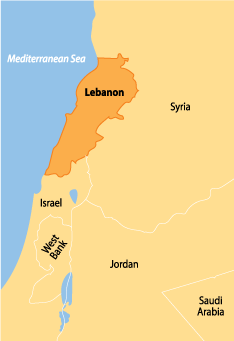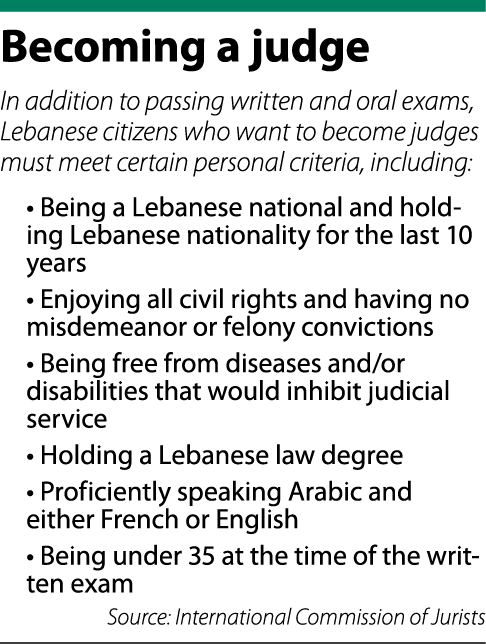Subscriber Benefit
As a subscriber you can listen to articles at work, in the car, or while you work out. Subscribe NowRoughly 1,000 people took the exam, but only 34 passed.
To call the Lebanese judicial exam difficult would be an understatement. Candidates interested in becoming a judge in the Middle Eastern nation of Lebanon must pass the test between the ages of 22 and 35, and many reach the upper limit without succeeding.
The exam is comprehensive, including in-person interviews, oral exams, a written test, an IQ test and a general review of an applicant’s reputation. Some aspiring judges go through the application process more times than can be counted on one hand, but among the 34 successful test-takers this time around was a 23-year-old with Indiana ties who succeeded on her first try.
Rindala Zgheib came to Indiana in 2016 as part of a master of laws program then offered through the Indiana University Robert H. McKinney School of Law. Through the program, Zgheib completed one semester of study in Lebanon and one in Indianapolis and left the program with two degrees in international and comparative law. She then began an intensive eight-month studying process that enabled her to become a member of an elite group of legal professionals who have succeeded on the Lebanese judicial exam with only one attempt.
Now, the 23-year-old is preparing for a three-year internship that will complete her judicial studies and enable her to officially ascend to the bench. As she prepares for the next phase in her legal career, Zgheib and an Indianapolis law professor are crediting her work ethic and her unique experience in the dual-masters program for her early success.
“Usually people do not pass this exam the first time, but I worked so hard on myself and I studied days and nights for eight consecutive months,” Zgheib said in a statement through the law school. “It is one of the hardest exams in Lebanon, but IU students are always ready to pass this kind of exam.”
 Making of a judge
Making of a judge
A native of the country where she will now become a judge, Zgheib’s life has consisted of activities such swimming, tennis, horseback riding and backgammon. She has also been active in scouting since 2003 and currently serves as an international scout leader and assistant commissioner of scouts in Lebanon.
Though she never planned on studying law, Zgheib made the last-minute decision to enroll in a legal program at Holy Spirit University of Kaslik in Jounieh, Lebanon in 2012. During her time in law school, Zgheib was chosen to participate in the International Criminal Court Moot Court Competition, acting as a defense attorney and earning a score of 92 out of 100 on her pleadings.
Zgheib also registered in each of her university’s international law courses and left the school with a certificate in international law. Then in 2016, her dean nudged her toward the dual-degree program at IU McKinney, sending her to Indianapolis for one semester to continue her international law studies.
While at McKinney, Zgheib participated in the school’s International Speaker Series, giving a presentation to students and faculty about criminal procedure in Lebanon. Frank Emmert, the executive director of the Center for International and Comparative Law at IU McKinney, said the dual-degree program Zgheib participated in was designed to teach international students to think like lawyers.
“We in the United States aim for people to think around an obstacle, find solutions and be creative …,” Emmert said. “That’s not something they’re very good at in other places around the world.
Zgheib participated in the second iteration of the Lebanon-Indianapolis exchange program and graduated with an LL.M. in May 2017, though she is still completing her thesis as the final step toward earning her master’s degree.
Filling the need
Meanwhile, the wheels of fate that would lead Zgheib to a judgeship were beginning to turn as the Lebanese government began preparing for its next round of judicial selection.
According to the Lebanese Ministry of Justice, the Minister of Justice is charged with announcing a number of trainee judges needed after consulting with the Supreme Council of the State or the Office of the Council of State. When the need for trainee judges —candidates who successfully pass the exam — is established, the minister asks the High Judicial Council to organize the exam.
That request sets off a series of events that leads to the selection of the trainee judges, according to a report from the International Commission of Jurists. The committee organizing the exam decides which subjects will be tested, according to the Ministry of Justice, and the HJC considers and makes decisions about which applicants will get to participate.
The first step is a primary interview before a panel consisting of the chairman and director of the Institute for Judicial Studies and a member of the HJC, followed by a second interview in front of the entire HJC. The first interview addresses general and legal knowledge, while the second interview — which a candidate must be chosen for — focuses solely on legal and judicial topics, according to the ICJ.
If an applicant succeeds in both interviews, they will be allowed to take the written test. Describing it as the hardest exam in the country, Zgheib said the written exam addresses candidates’ abilities to memorize the law and analyze “hard and nearly impossible cases.”
“… (Y)ou cannot have one correct answer, but instead it all depends on your analysis and the way you solve the cases,” Zgheib wrote in an email to Indiana Lawyer.
 Preparation and prayer
Preparation and prayer
For Zgheib, success on the oral and written exams meant spending eight months doing nothing but poring over legal texts. She read books covering civil, criminal and commercial law and civil procedure, as well as materials that would enhance her performance on the IQ and language portions of the application process. Plus, during the interview process, Zgheib said interviewers will conduct background research and will even visit candidates’ homes.
“I worked so hard on my personality and speaking skills,” Zgheib wrote. “… It was a big challenge for me especially because I kept hearing things like, ‘you can’t do it,’ ‘it is really hard,’ ‘you have to study more,’ ‘many people studied a lot but failed,’ etc.”
Candidates such as Zgheib who succeed on the written test then move on to an oral exam, the final step in the application process. Zgheib recalled feeling hopeless, noting she met some test-takers who were on their sixth try.
Even so, Zgheib did not let herself quit. One day while she, her sister and a friend were driving around, her sister decided to visit a local church and pray for Zgheib to pass. It was during that time of prayer that she got the news.
“I got a call from a friend … (who) told me, ‘Congratulations Judge Rindala, you really deserve it!’ I really appreciated this call and I will never forget it for the rest of my life.”
Highly qualified
Still basking in the afterglow of her success, Zgheib is preparing for a three-year internship at the Institute of Judicial Studies, where she will hone her judicial skills by assisting sitting judges in the analysis and deliberation of cases. From there, Zgheib said she hopes to earn a doctoral degree while leaving the future open.
Though McKinney’s dual-degree offering with Lebanon is not beginning a new program this year, both Zgheib and Emmert said the skills learned through the program enable international students such as Zgheib to succeed even when they set lofty goals.
“She’s not the first one to do very well professionally, though she is the first one who took and passed the judges exam,” Emmert said. “This program makes a big difference for their qualifications.”•
Please enable JavaScript to view this content.

